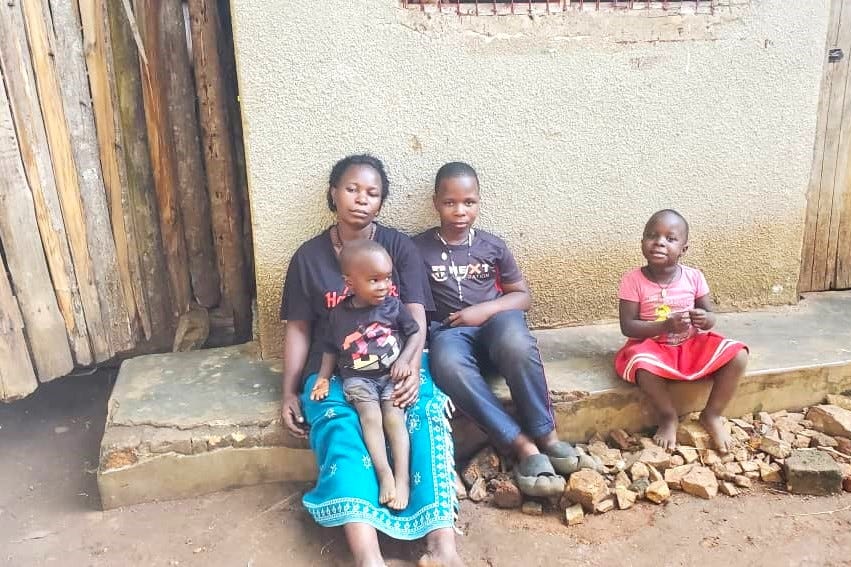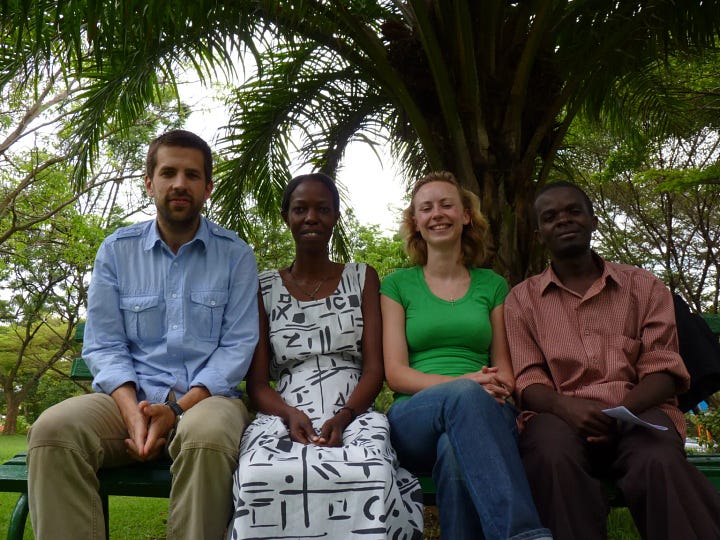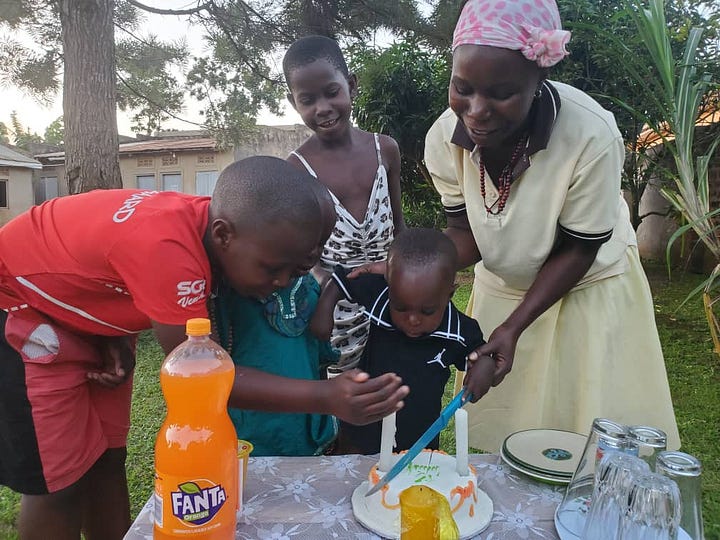Illegally Detained for Helping Farmers Resist Land Seizure, Ugandan CW Activist Is Finally Home
But 37 families from Kiganzi village remain displaced. Plus: Cleveland CW protests Labor Day air show; the virtues of CW precarity; and how to start a CW house.
A Summer Visiting Catholic Workers
Joan Bamberek reflects on her summer visiting Catholic Worker communities as part of her Valder Award scholarship with CatholicWorker.org:
This past spring, I was sitting at my desk, looking around for social justice opportunities. I had just found out that I won the Valder Award, a scholarship my school gives each year that connects students with social justice movements. As I was researching organizations I could join, I realized that there was not one specific issue that stood out to me. After having conversations with my scholarship director and alumni, I finally came into contact with the Catholic Worker Roundtable.
While I had learned some general facts about the Catholic Worker during my time at Catholic school, I never was informed about what the movement looked like today. Because of this, going into my internship, I had very limited information: just what I had heard and what I had looked up.
Needless to say, through the summer, I began to learn more about Dorothy Day and the Catholic Worker. During my trip to Milwaukee to visit St. Bakhita Catholic Worker, I had the time to stop at the Dorothy Day archives located at Marquette University. This experience allowed me to sit down and read the words of Dorothy Day, from the letters she wrote to friends and family to the manuscript for a book that was never published. Reading her words gave me the ability to become closer to her, helping me to better understand her reasonings for her priorities and opinions for the Catholic Worker.
At the same time, I was able to visit some Catholic Worker houses in the Midwest. At each house, I got to witness to a community that was striving for betterment in the world. Through my visits, I saw that community members would not only talk about the issues, but they would also live by what they were teaching.
These experiences have also shaped my understanding of social justice. What began as the idea of movements that could change a nation turned into the idea of the importance of building powerful communities that live in the values that they fight for. The Catholic Worker Movement, with its emphasis on simplicity, hospitality, and nonviolence, has shown that change starts at the grassroots level.
As I move forward in my journey, I carry with me the lessons learned from the Catholic Worker houses I visited and the words of Dorothy Day. I now understand that social justice is not just about advocating for change; it is about embodying the principles of love, compassion, and solidarity in our daily lives. My time with the Catholic Worker has inspired me to continue seeking out ways to contribute to the other communities I am a part of, not just in theory, but in practice.
—Joan
Joan Bamberek is a senior at Loras College double majoring in political science and international studies. We wish her well with her future adventures!
A Few Words About This Issue…
Hey everyone, it’s Jerry with a few words about this issue:
This issue is a bit shorter than most because of the amount of time devoted this week to our lead story about the illegal detention of Elizabeth Nakiwolo and Michael Sekitoleko, co-founders of the Uganda Catholic Worker. Thanks for your understanding.
In the interest of disclosure and transparency, we sent funds to Michael to pay for his expenses as he attempted to find Elizabeth, and we sent Roundtable funds to help pay the extrajudicial “fine” (read: bribe) so she could be released from detention. We don’t expect this to become a habit, for lots of reasons, but in this circumstance, given the gravity of the situation and the lack of local resources available to the Uganda CW, we felt it was in the spirit of the CW to help out.
And finally, look for a reader survey sometime in the next week or two. Thanks, everybody, for reading—and for doing all that you do to make the world a place where it is easier to be good.
—Jerry

FEATURED
After Being Illegally Detained 80 Days, Ugandan CW Activist Returns Home
But 37 Families Displaced After Illegal Land Grab



Elizabeth Nakiwolo, one of three founding members of the Uganda Catholic Worker, is home with her three children after spending 80 days being held in unofficial detention facilities. She and fellow UCW founder Michael Setikoleko were both arrested on June 9 and subsequently detained without being charged or having a court hearing.
The pair were among seven activists attempting to inform residents of Kiganzi village of their rights under Ugandan law as they faced displacement from the land where they lived and farmed. The activists had gone to the village with lawyers in early June to advise the 37 affected families, most of them farmers growing matoke or coffee.
Setikoleko was released in early July; after recovering for several weeks in a hospital and at home, he tracked down Nakiwolo and secured her release on Wednesday after paying 2 million Ugandan shillings (about $600) to the authorities holding her. The money was provided to Setikoleko from the Roundtable budget.
In Uganda, it is illegal to hold someone in detention without charging them with a crime or providing a court hearing. The Ugandan Constitution mandates that a suspect must be brought before a magistrate within 48 hours of arrest. However, there have been numerous documented cases of arbitrary detentions and torture, particularly involving government critics, opposition supporters, and peaceful protesters, according to a 2021 Human Rights Watch report. These detentions often occur in unsanctioned places, sometimes referred to as “safehouses” because they were originally supposed to be used for witness protection.
The land seizure was also illegal. Illegal land seizures are common in Uganda, often driven by powerful individuals exploiting vulnerable communities. The lack of legal protection and rampant corruption enables these unlawful practices, leaving many families displaced and without recourse. Despite a 2013 presidential statement officially condemning the practice, the problem persists.
After recovering from infections he acquired during his detention, Setikoleko returned to the village to document the aftermath of the displacement. He found many of the residents gone; those who remained were homeless. “They have no houses, they have no homes, they have no gardens, they don’t have any money so that they can try to raise a living and make a life out of it,” Setikoleko told Roundtable by WhatsApp. Several residents have died by suicide or heart-related conditions.
Setikoleko reports that the residents’ houses, crops, and farm-related structures had been razed and military personnel posted near the perimeter of the site. He was re-arrested on August 2 for attempting to photograph and make video recordings of the the site. He was released on August 5 after authorities wiped his phone.
This isn’t the first time Sekitoleko has been arrested for intervening on behalf of subsistence farmers fighting land seizures. He was previously detained for six weeks in 2017 for bringing pro bono lawyers to educate peasants about their rights under Ugandan law.
Although Nakiwolo has been reunited with her children, she faces numerous challenges going forward, including infections and ulcers she acquired during detention, psychological trauma, and the likelihood of losing her rented home; she is three months behind on rent payments, about $80, and her landlady has begun eviction proceedings.
You can read a longer, more detailed version of this story at CatholicWorker.org.
We’ve set up a GoFundMe to raise $250 to help Elizabeth with her rent, food, and medical care. You can contribute here.
Cleveland Catholic Worker Protests National Air Show
This weekend is the Cleveland National Air Show, a Labor Day tradition in Ohio. For almost 40 years, it has also been a tradition for the Cleveland Catholic Worker to protest the event. Cleveland Magazine reported on these nonviolent protests on August 28th in anticipation of the event. The article details the reasoning for these protests for the Cleveland CW community:
It began in the mid-1980s, when refugees from El Salvador, Guatemala and other parts of Central America, who were provided sanctuary at the Catholic Worker’s former Casa San Jose at West 44th Street and Lorain Avenue, experienced trauma responses to the sounds of fighter jets overhead. The Catholic Worker community realized the refugees had been on the receiving end of bombs dropped by these same planes and, in solidarity, launched a conscientious opposition to the Air Show.
“What we hear as entertainment in Cleveland are the sounds of war and fear in other countries,” says Mike Fiala, a member of the Catholic Worker community who started attending the witness in 1989. ‘These are fighter jets painted up to look like they’re entertainment, doing these incredible aeronautic maneuvers, when actually they are planes we use and sell to other countries that wreak havoc on the planet.”
Read more at Cleveland Magazine.
Letters: A Response to the Launching of a “Dorothy Day Foundation”
Last week we reported on the launch of the Dorothy Day Foundation, a nonprofit organization offering grants of $500 to $2500 to Catholic Worker communities in financial need and willing to participate in a financial mentoring relationship. Brian Terrell (Strangers and Guests Catholic Worker, Naloy, Iowa) wrote a lengthy letter in response to the news. Here’s an excerpt:
Michael Doyle’s genuine concern that sustainable funding could save Catholic Worker houses and farms from closing is misplaced, I think. There is some sadness, of course, in seeing the end of communities like those in Waukesha, Austin and Detroit after so many years, but this may be just the course of a natural life for these communities. “The Holy Spirit is not at work only in durable institutions which last through the centuries, He (sic) is also at work in ventures that have no future, which have always to be begun again,” Dorothy’s friend Jacques Maritain wrote in his Journal de Raisa. Another friend and contributor to The Catholic Worker, Thomas Merton, noted in his Conjectures of a Guilty Bystander, that “love is more important than organizations and a small, apparently insignificant and disorganized circle of friends united by love and a common venture in Christian witness may be of far greater value to the Church than an apparently thriving organization that is in reality permeated with the frenzies of activistic and ambitious willfulness.”
Betsy and I have been on this farm in rural Iowa for almost 40 years, living mostly off the land and supported by part time jobs and weaving rugs. We hardly ever beg (except when needing a car or a new roof or I am in jail) but are grateful for the help of generous friends. What donations we get are from folks who know us. We are getting old (every time I muck out the goat’s barn I think, this HAS to be the last time) and would love to have some of the many wonderful young folks who come though here for a week or a month or a year to stay on and continue this work we began so long ago after we are gone. I am more than consoled, though, to know how many of these young Catholic Workers who have visited us have started their own projects on the land in other places and I know that they are making the better choice.
Sometimes, too, a Catholic Worker house closing is even a moral victory, such as the losses when the movement refused to support the war effort in World War II. In 1972, when a Catholic Worker House in Chicago closed because Karl Meyer was imprisoned for resisting the taxes that funded the war in Vietnam, for Dorothy it was a cause to celebrate.
Some Catholic Worker communities flourish in their poverty for many years and even through the conflicts and travails of the long loneliness, somehow keeping alive the revolutionary vision and passing it on to a younger generation. “If we lose the vision,” though, as Dorothy warned, “we become merely philanthropists, doling out palliatives” Worse than any Catholic Worker house closing, I fear, is a Catholic Worker house falling into lethargy, continuing to dole out their palliatives with full foundational funding long after the vision is spent.
. . .
The real and present danger faced by the Catholic Worker at this point in its history when the figure of Dorothy Day is being exalted is not that we might go broke but that we might get too comfortable. Yes, some houses will find themselves without money (to the degree that they remain faithful to the vision, most likely) while others will rake it in on the Dorothy Day “brand.” We can rejoice to think that some Catholic Workers may even be rendered homeless, but it won’t be many and these will have friends to appeal to. This is the lot of the poor that we have chosen.
“Voluntary poverty,” Peter Maurin would say, “is the answer. Through voluntary poverty others will be induced to help his brothers. We cannot see our brother in need without stripping ourselves. It is the only way we have of showing our love.”
Saint Dorothy Day, keep us poor by your prayers.
You Have Been Told, O Mortal…

THE ROUNDUP
In 2019, as Anthony Lanzillo was just beginning his climate activism as part of his work at Loaves and Fishes Catholic Worker (Duluth, Minnesota), he decided to organize a public forum with Covering Climate Now. The hitch? He had just two weeks to pull everything together. Read how it all unfolded in Finding My Footing: A CW Climate Activist’s Story (Part 3).
FarmFest is the annual fundraising music festival for The Catholic Worker Farm and their connected house, Mary House, which provides accommodation, food, English lessons, counseling and other services for female asylum seekers and their children. FarmFest accounts for nearly a quarter of the community’s annual funding.
The St. Benedict Catholic Worker “Fan Club”: St. Benedict Catholic Worker in Fresno, California, is purchasing 20” box fans from Walmart and distributing them to the community. Many residents in the area have no air conditioning or cannot afford to run refrigerating window air units. With temperatures in the triple digits, these fans are saving lives during excruciatingly hot summer days.

Sunny Neelam of the Dorothy Day Catholic Worker (Washington, D.C.) is pictured protesting the death penalty in front of the Supreme Court as part of a commentary in Salon about Democrats’ “principled retreat” from the abolitionist cause. Read the commentary here: The end of the abolition era: Democrats quietly drop their opposition to the death penalty
The life and legacy of Philip Berrigan was the focus of a recent conversation on Baltimore’s WYPR radio’s Midday program; author Brad Wolf and Viva House founders Brendan Walsh and Willa Bickham were guests on the program; listen here.
The Catholic Worker Movement is “one of the clearest and boldest examples” of the U.S. Catholic Church’s support for the dignity and rights of workers, says a Labor Day-themed article in the Hawaii Catholic Herald, newspaper of the Archdiocese of Honolulu.
“Two Agitators” Booklets Available: Brian Terrell has printed copies of “Two Agitators,” the a booklet available for purchase for $3.55 (the cost of printing). Send requests to Strangers and Guests CW Farm, 108 Hillcrest Drive, Maloy, Iowa 50836, att. Peter and Ammon.
A number of Catholic Workers are remembering the anniversary of John Leary’s death, which occurred on August 31, 1982. Leary, a Harvard graduate and a member of Haley House Catholic Worker community in Boston, made a deep impression on many of those who met him. He co-founded the Pax Christi Center on Conscience and War and was actively involved in nonviolent protests against nuclear weapons and abortion. He was also a member of the Ailanthus Resistance Community. Influenced by Eastern Christian spirituality, Leary often prayed the Jesus Prayer while running between the Pax Christi Center and the Catholic Worker. He may have been praying those words when he died suddenly while jogging on the Boston Common. Read a short biography at this Facebook post.
CALENDAR
September 2 | St. Louis Catholic Worker
Dorothy Day & Anarchism: a discussion
September 6-7 | Chicago, Illinois
Peter Maurin Conference
September 11 | London Catholic Worker
The Priest’s Tale / Nuclear Disarmament
September 12-15 | Sugar Creek, Iowa
Midwest Catholic Worker Gathering
September 13-14 | Saint Kateri National Shrine, Fonda, New York
26th Annual Kateri Peace Conference
September 21 | Platteville, Wisconsin
Little Platte Catholic Worker Farm Landwarming and Celebration
September 24 | St. Bakhita Catholic Worker, Milwaukee, Wisconsin
Contemplative Prayer to End Racism
October 4-6 | St. Francis Catholic Worker, Chicago, Illinois
Catholic Worker National Gathering
October 9 - April 10 | St. Bakhita Catholic Worker, Milwaukee, Wisconsin
Dorothy Day: Patron Saint of Both/And
A FEW GOOD WORDS
How to Start a House of Hospitality
by Arthur Sheehan
A letter from Arthur Sheehan, managing editor of the Catholic Worker and the first biographer of Peter Maurin, to a letter-writer interested in starting a house of hospitality. You can read the full letter in the Catholic Worker archives at Marquette University.
You have probably gathered from House of Hospitality that the movement has a three-fold program: clarification of thought; houses of hospitality; and farming communes. Clarification of thought is produced by study, reading, and discussion, and is tremendously important because right thought brings about right action. Houses of hospitality are demonstrations of our love for our brothers in Christ and a means of "indoctrinating” them and bringing them back to Christ. They serve as centers for the practice of the works of mercy and as discussion centers. Farming communes are the long-range program to bring people back to the land. At present there are thirty-three houses of hospitality and eleven farming communes throughout the country.
The usual procedure in starting a house of hospitality is for the interested people to get together and hold weekly meetings in someone’s home.
At these meetings they read the paper carefully; usually they read Houses of Hospitality, and Easy Essays (by Peter Maurin). They discuss the program and ideas of the Catholic Worker movement until they are convinced that voluntary poverty and Christian charity are the right means to bring about “a new earth wherein justice dwelleth” or to quote Peter, “a new society within the shell of the old, with the philosophy of the new, which is not a new philosophy but a very old philosophy, a philosophy so old that it looks like new.”
As the group gains confidence they usually rent a house or store front in a very poor section of the city—the poorer the better—and begin serving coffee and sandwiches or soup at a regular time each day, and giving out old clothes.
It is best if the interested members can move into the house, and live there, but in cases where because of other responsibilities or because of unfavorable circumstances they are unable to do so, someone has always been found to take the responsibility of running the house.
Then the group usually continue their weekly discussion meetings at the house and eventually take up crafts, and plan to start a farming commune. But too much must not be attempted at once. Small beginnings are best.
Roundtable covers the Catholic Worker Movement. This week’s Roundtable was produced by Jerry Windley-Daoust, Renée Roden, Joan Bromberek, Monica Welch, and Scarlett Ford.
Roundtable is an independent publication not associated with the New York Catholic Worker or The Catholic Worker newspaper. Send inquiries to roundtable@catholicworker.org.







